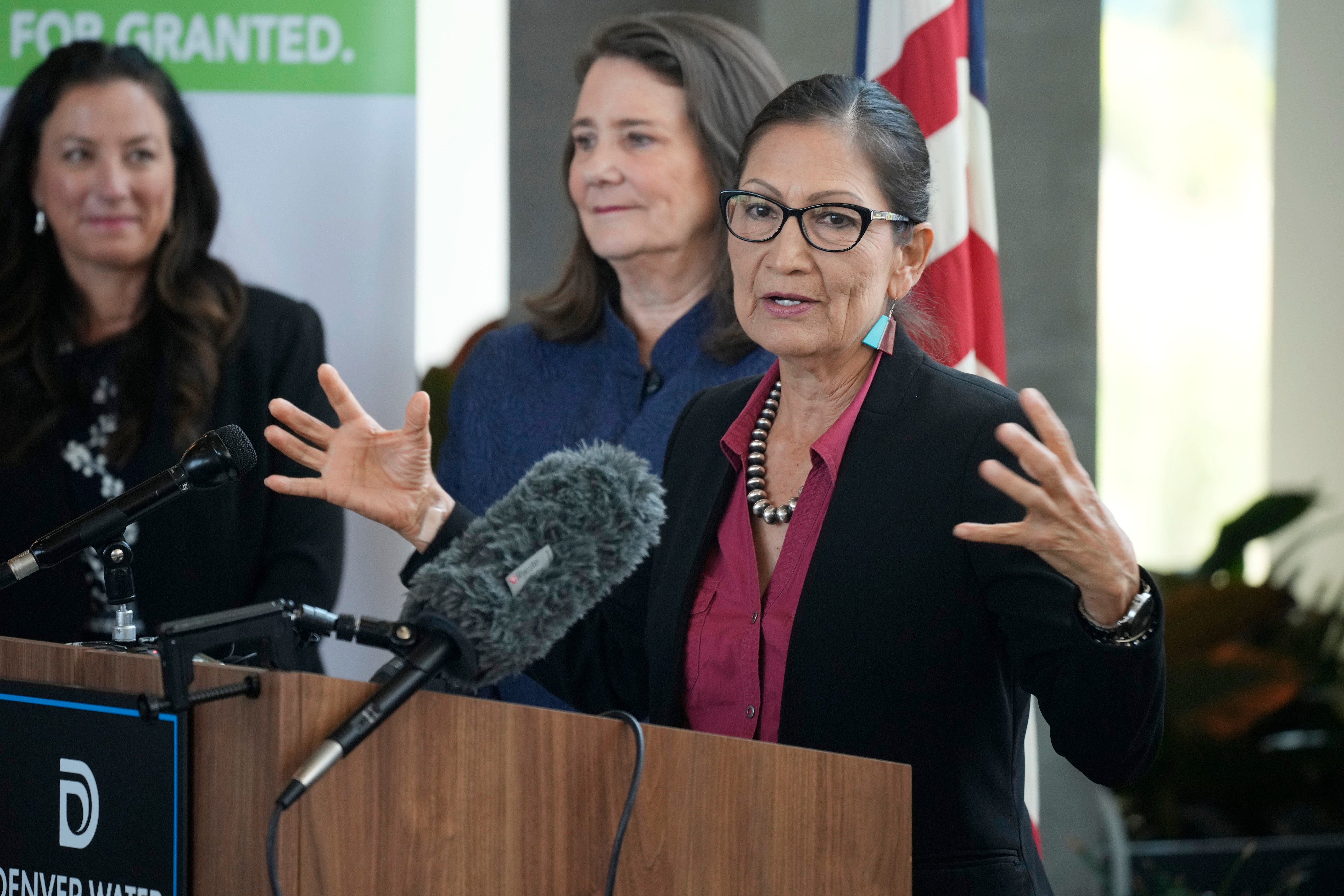Interior secretary visits new public lands HQ in Colorado
Interior Secretary Deb Haaland is paying her first visit to the new Colorado headquarters of the Bureau of Land Management

Your support helps us to tell the story
From reproductive rights to climate change to Big Tech, The Independent is on the ground when the story is developing. Whether it's investigating the financials of Elon Musk's pro-Trump PAC or producing our latest documentary, 'The A Word', which shines a light on the American women fighting for reproductive rights, we know how important it is to parse out the facts from the messaging.
At such a critical moment in US history, we need reporters on the ground. Your donation allows us to keep sending journalists to speak to both sides of the story.
The Independent is trusted by Americans across the entire political spectrum. And unlike many other quality news outlets, we choose not to lock Americans out of our reporting and analysis with paywalls. We believe quality journalism should be available to everyone, paid for by those who can afford it.
Your support makes all the difference.Interior Secretary Deb Haaland is paying her first visit Friday to the new Colorado headquarters of her department's Bureau of Land Management after its relocation from the nation's capital by the Trump administration sparked criticism that the move was intended to gut the agency that oversees vast tracts of public lands in the West.
The BLM headquarters has been in staffing turmoil after the 2019 move to Grand Junction and after four years without a confirmed director. Interior had planned to move more than 320 headquarters jobs to Grand Junction. But agency officials recently confirmed that only three workers ultimately relocated. The revelation was first reported by the media outlet Colorado Newsline.
Haaland is reviewing whether the move should stand. Proponents of the move called it a reorganization that put top agency officials closer to the nearly quarter-billion acres of public lands it oversees. Environmental advocates say it weakened the agency which handles fossil fuel extraction, recreation and livestock grazing. As a member of Congress, Haaland opposed the move.
In Grand Junction, Haaland also planned to address the federal government's wildfire preparedness and response efforts. Wildfires again are raging throughout the West; southern Oregon’s Bootleg Fire is one of the largest in the state’s modern history. Colorado saw its three largest wildfires on record last year.
Extremely dry conditions and recent heat waves tied to climate change have made wildfires harder to fight. Climate change has made the West much warmer and drier in the past 30 years and will continue to make weather more extreme and wildfires more frequent and destructive.
Wildfires scorched more than 10 million acres (4 million hectares) of land and almost 18,000 houses and other structures last year, according to federal data and the research group Headwaters Economics.
U.S. officials have said they will try to stamp out wildfires as quickly as possible to avoid conflagrations such as the Bootleg Fire. The administration also wants to vastly expand the amount of land where tree thinning, controlled burns and other measures are used to reduce flammable material.
The federal government spends roughly $2 billion to $3 billion annually attacking wildfires. The administration is seeking a nearly 40% increase, to $1.7 billion, in additional funds for managing fire dangers through thinning, controlled burns, and related projects.
Democratic Gov. Jared Polis and Colorado’s congressional delegation have urged the Biden administration to keep the BLM based in Grand Junction. Democratic U.S. Sen. John Hickenlooper, who invited Haaland to visit Grand Junction, has said the headquarters relocation was “done in haste” and let down the city, which hoped for an economic boost.
The bureau has close to 10,000 employees, most of them in field offices in the West.
President Joe Biden s nominee to lead the BLM, Tracy Stone-Manning, received no Republican support in a Senate Energy and Natural Resources Committee vote on her nomination Thursday. The GOP has lambasted Biden's pick over alleged links to a 1989 environmental sabotage investigation.
Stone-Manning will face a full Senate vote in order to become the new director. It would take every Senate Republican plus at least one Democratic lawmaker to block her confirmation in the evenly divided chamber. Haaland, who would be Stone-Manning's boss, reiterated her full support for the nominee after Thursday's vote.